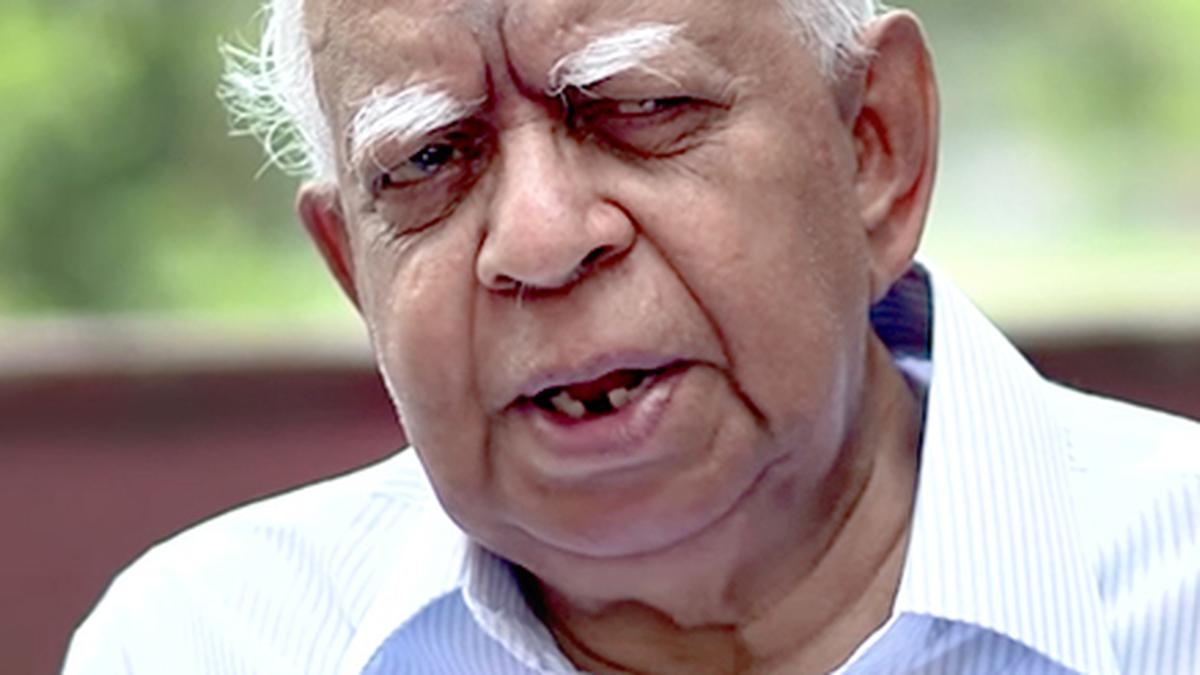
A moderate voice for Sri Lankan Tamils Premium
The Hindu
The recent passing of R. Sampanthan, a veteran leader of the Tamil National Alliance in Sri Lanka, has created a vacuum in the political leadership of the Tamils, who are yet to exit the trauma of the civil war that ended 15 years ago.
The recent passing of R. Sampanthan, a veteran leader of the Tamil National Alliance (TNA) in Sri Lanka, has created a vacuum in the political leadership of the Tamils, who are yet to exit the trauma of the civil war that ended 15 years ago. Sampanthan may not have been able to achieve great progress in the resolution of the Tamil question, but he was seen as a stabilising force, especially in the post-civil war years. He engaged with everyone, including the Sinhalese leadership.
A follower of S.J.V. Chelvanayakam, who founded the Ilankai Tamil Arasu Katchi (ITAK) in 1949, Sampanthan was first elected in 1977 to the Sri Lankan Parliament as one of the 17 MPs of the Tamil United Liberation Front (TULF), which included the ITAK. This coalition swept the parliamentary poll in Tamil constituencies on the plank of a separate state. The 1983 anti-Tamil pogrom led to an exodus of Tamils to India, which drew New Delhi into the ethnic problem. The nature of India’s involvement changed when Rajiv Gandhi succeeded his mother Indira Gandhi as Prime Minister, after her assassination in 1984.
Sampanthan witnessed the shift in the Indian government’s treatment of the TULF. From being the sole representative of the Tamils, the coalition became one of the representatives, as was evident in the 1985 Thimpu talks, which were held to find a solution within the framework of the Sri Lankan Constitution. Later, the Indian government began to engage more with the Liberation Tigers of Tamil Eelam (LTTE). When the Rajiv-Jayawardene Accord of July 1987 was signed, the LTTE was not a signatory, but India’s discussions were primarily with the Tigers. This approach displeased the TULF, including Sampanthan. The 13th Amendment, providing for the establishment of provincial councils across the island with limited autonomy, was a major outcome of the Accord, but it was met with a lukewarm response from Tamil leaders. Between 1985 and 2000, the LTTE killed several scholarly and moderate leaders, such as Neelan Tiruchelvam and A. Amirthalingam.
In the 2000s, Sampanthan was among a handful of Tamil leaders left in the scene and grew in prominence. Given his sense of pragmatism, Sampanthan, who was said to be on the ‘hit list’ of the LTTE once, began taking a pro-LTTE stand and supported the “freedom struggle” of the Tigers during the 2001 parliamentary polls. The Tamil National Alliance (TNA), which included the TULF, came into being in 2001. It nominated the LTTE, which it called “the sole representative” of the Tamils, to negotiate with the Sri Lankan government. Unsurprisingly, the TULF, which secured five seats in the 2000 parliamentary polls, captured 15 seats in 2001. Then, the United National Party won 109 seats and Ranil Wickremesinghe became the Prime Minister. The next year, his regime signed an agreement with the LTTE, facilitated by Norway.
After the LTTE was vanquished in May 2009, Sampanthan guided the TNA cautiously, avoiding an extreme or confrontational approach. There were occasions where the TNA did not go along with the government of the day — for instance, by refusing to join the All Party Representative Committee for arriving at a political solution in 2009. However, in the last 15 years, the TNA has not boycotted any major election. In 2013, it won the polls to the Northern Provincial Council although the performance of Chief Minister C.V. Wigneswaran (2013-2018), chosen by Sampanthan, proved to be a disappointment. In the 2010 and 2015 presidential elections, the TNA backed the Opposition candidates — General (retd.) Sarath Fonseka, who played a major role in the LTTE’s defeat, and Maithripala Sirisena, who had served as Defence and Health Minister in Mahinda Rajapaksa’s Cabinet. When Mr. Sirisena stunned the world by defeating Mr. Rajapaksa, the TNA’s backing was cited as a major reason.
After the civil war, the Sampanthan camp focused on accountability, truth, justice, and the permanent political settlement of the Tamils rather than on economic reconstruction of the war-hit Northern and Eastern Provinces. They also pursued the unrealisable goals of federalism and self-determination. Before quitting as President in January 2015, Mr. Rajapaksa oversaw the restoration of basic infrastructure in the affected areas. Much more needs to be done, but this has sadly not been a priority for the Sampanthan camp. With the cream of Tamil society having settled in the West and elsewhere, the politically and economically weak sections are in no position to bargain with the Sinhalese leadership for greater devolution of powers. The Tamil youth living in the North and the East prefer to work as unskilled labourers elsewhere in the world and study further. Unless the North and the East become economically strong, the situation will remain the same.
When Sampanthan died, he was apparently isolated within his political formation. Like him, Sri Lankan Tamils too have been cut off from society. This is in large part due to the unwillingness of the Sinhalese political leadership to address their aspirations. It is high time Tamil political players strove for greater space in the economy for the Tamils and motivated the youth to pursue higher studies. India, which has a moral responsibility towards the Tamils, should support any endeavour that will enhance the economic status of the community in “united, undivided, indivisible” Sri Lanka, as Sampanthan said.

Andhra Pradesh CM Chandrababu Naidu inaugurates CNG, PNG projects in Rayalaseema region. Andhra Pradesh has the unique distinction of being the second largest producer of natural gas in India, thanks to the Krishna-Godavari (KG) Basin, he says, adding the State will lead the way towards net-zero economy.










